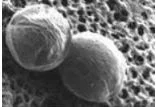Cholera is an acute diarrheal illness caused by infection of the intestine with the bacteria Vibrio cholerae. Cholera was prevalent in the 1800s, but due to proper treatment of sewage and drinking water, has become rare in developed countries. V. cholerae can be found in contaminated food or water, especially in areas of poor sanitation and water treatment.
Escherichia Coli
Escherichia coli, abbreviated E. coli, is a bacterium that is found in the large intestine or feces of healthy warm-blooded animals and humans. Most E. coli strains are harmless and serve a useful function in the body by stopping the growth of harmful bacteria species and by making necessary vitamins.
Helicobacter Pylori
Helicobacter pylori (H. pylori) are a type of intestinal bacteria that cause the majority of ulcers in the stomach and duodenum. They thrive in highly acidic environments and have a unique way of adapting to the harsh environment of the stomach. H. pylori have been classified as low-potential carcinogens (cancer-causing substances) by the World Health Organization.
Hepatitis A
Hepatitis is the name for several different illnesses all caused by an inflammation of the liver. Drinking alcohol and taking drugs can cause hepatitis, but it can also be caused by a viral infection. Hepatitis A is a disease caused by the Hepatitis A Virus (HAV). It is the most common type of hepatitis, with at least 1.4 million reported cases world wide every year.
Viruses
Detailed Campylobacter
Detailed Cryptosporidium
Detailed Escherichia Coli
Escherichia coli, also referred to as E. coli, is a type of fecal coliform bacteria that is found in the intestines of healthy warm-blooded animals and humans. Most E. coli strains are harmless and serve a useful function in the body by stopping the growth of harmful bacteria species and by making necessary vitamins. However, some strains can be opportunistic pathogens, while others can cause gastrointestinal illness in healthy humans when ingested.













